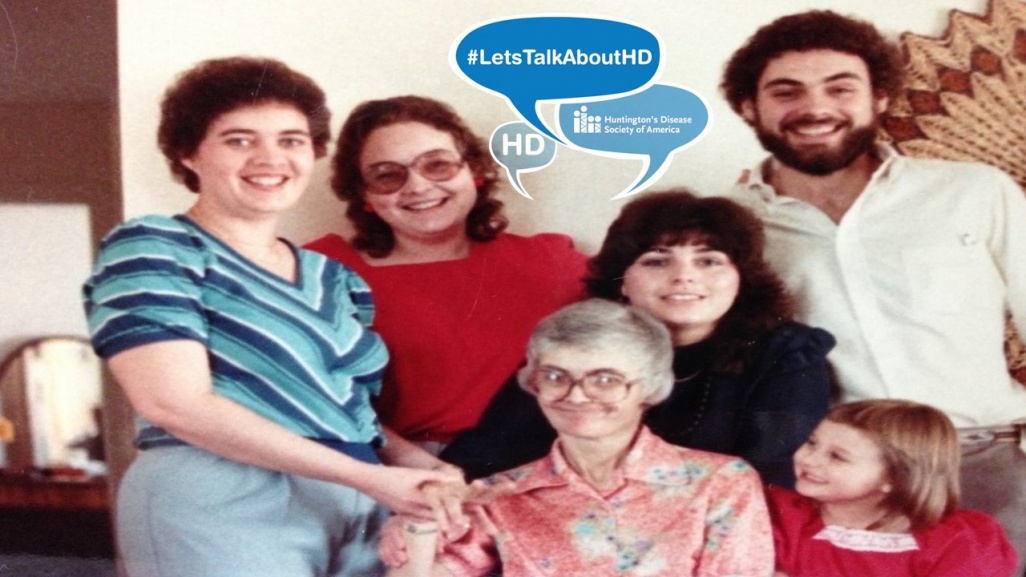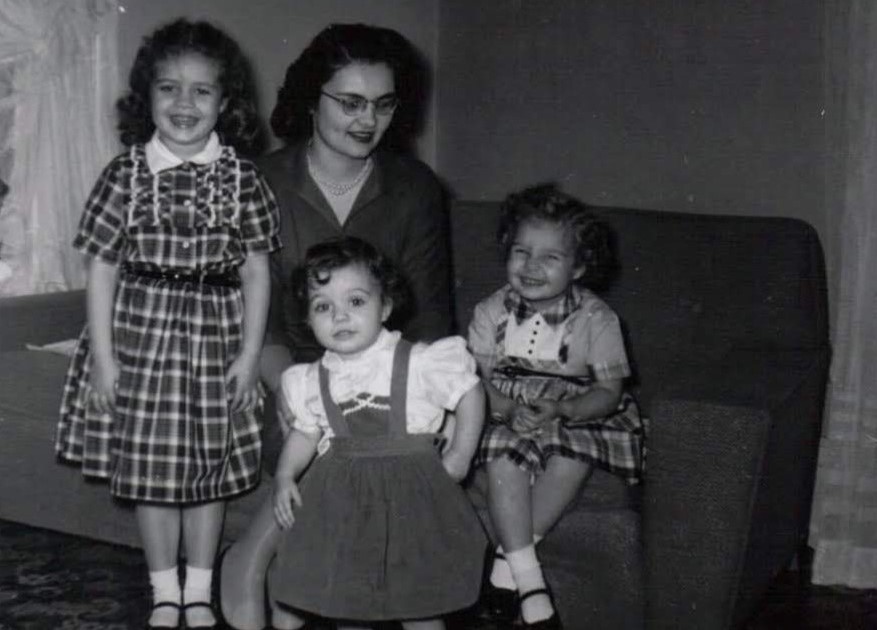
By Matthew Santamaria (msantamaria@hdsa.org)
Memphis resident Laura Wilson has been familiar with Huntington’s disease (HD) her entire life.
HD is a fatal genetic disorder that causes the progressive breakdown of nerve cells in the brain. It deteriorates a person’s physical and mental abilities usually during their prime working years and has no cure.
When her grandmother was a baby, she was left on a door step to a family that would adopt her. Laura’s grandmother was the first one in the family to show symptoms of HD. The symptoms of Huntington’s disease are described as having ALS, Parkinson’s and Alzheimer’s – simultaneously.
Symptoms include personality changes, mood swings, depression, impaired judgement, involuntary movements, slurred speech, difficulty in swallowing, and significant weight loss.
“I was young, but very aware of her odd behavior,” said Laura. “My oldest sister was often chased by her where she sought refuge under the dining room table. We tried to take a wide berth around her.”
Laura’s grandfather took care of Laura’s grandmother at home until the day she passed away.

However, HD is genetic which means that Laura’s mother has a chance of inheriting the disease and the cycle may not be over. Each child of a parent with HD has a 50/50 chance of inheriting the faulty gene that causes Huntington’s disease.
Laura’s mother was a mother of four children. According to Laura, her mother had similar symptoms as her grandmother which include personality changes. Her father wanted her mother to be tested for HD to make sure.
The decision to get genetically tested is difficult to make. Each year, 5-10% are tested. It is never the right or wrong decision to be tested. There are people that see no benefit in knowing that they will develop the disease while others want to know in order to make informed choices about their future. It can take up to several weeks to receive your results from the genetic testing center.
“Looking back, I can't imagine how hard it must have been for a mother of four children while dealing with her onset of HD,” said Laura. “I remember our family physician visit when mom found out. My Dad went back with her while we waited in the waiting room. She came running out of the back and straight out the door of the doctor’s office screaming NO! Dad had known for a while that she must have had it, but he wanted it confirmed. Our family doctor used cognitive tests, because at the time, I don't think there was a blood test.”
Her mother did not take the news well as the disease would progress. After divorcing Laura’s father, she was placed in a facility at the age of 42-years-old.
She passed away at 52-years-old.
Three years before her mother passed away, the cycle would not end as Laura started to notice HD symptoms in her middle sister. Few years later, her older sister and younger brother were also diagnosed with the gene that causes HD.
“I never said anything because it was heart breaking with no treatment or cure, why would I,” Laura explains. “I have never seen anyone give up more quickly than my middle sister, and never saw anyone fight it more than my older sister. She always kept the faith.”
Laura’s niece was also diagnosed with the gene that causes HD and would eventually live in the same nursing facility as her aunt and uncle. However, all four passed away due to complications from HD. Laura’s older sister at fifty-eight-years-old, Laura’s middle sister at forty-four-years-old, Laura’s younger brother at fifty-five-years-old.
There are four members of the family still at risk for HD including her older sister’s two children and niece’s two children. Her brother never had children because he was worried about the chances of HD.
As for Laura, she has never been tested for HD but has shown no symptoms of HD. She has attended local HD fundraisers including golf tournaments and Team Hope Walks. Laura has also attended support group meetings.
###
Huntington’s disease is a fatal genetic disorder that causes the progressive breakdown of nerve cells in the brain. It deteriorates a person’s physical and mental abilities usually during their prime working years and has no cure. Every child of a parent with HD has a 50/50 chance of inheriting the faulty gene that causes Huntington’s disease. Today, there are approximately 41,000 symptomatic Americans and 200,000 at-risk of inheriting the disease. In less than 10% of cases, juvenile Huntington’s disease (JHD) affects children & adolescents. JHD usually has a more rapid progression rate than adult onset HD; the earlier the onset, the faster JHD progresses. HD is described as having ALS, Parkinson’s and Alzheimer’s diseases – simultaneously. HD is characterized by a triad of symptoms, including progressive motor dysfunction, behavioral disturbance and cognitive decline.
The Huntington’s Disease Society of America is the premier nonprofit organization dedicated to improving the lives of everyone affected by HD. From community services and education to advocacy and research, HDSA is the world’s leader in providing help for today and hope for tomorrow for people with HD and their families.
To learn more about Huntington’s disease and the work of the Huntington’s Disease Society of America, visit www.HDSA.org or call 1(800)345-HDSA.
This is a story featuring a personal experience with Huntington’s disease. If you would like to have your story told please contact Matthew Santamaria at msantamaria@hdsa.org
Memphis resident Laura Wilson has been familiar with Huntington’s disease (HD) her entire life.
HD is a fatal genetic disorder that causes the progressive breakdown of nerve cells in the brain. It deteriorates a person’s physical and mental abilities usually during their prime working years and has no cure.
When her grandmother was a baby, she was left on a door step to a family that would adopt her. Laura’s grandmother was the first one in the family to show symptoms of HD. The symptoms of Huntington’s disease are described as having ALS, Parkinson’s and Alzheimer’s – simultaneously.
Symptoms include personality changes, mood swings, depression, impaired judgement, involuntary movements, slurred speech, difficulty in swallowing, and significant weight loss.
“I was young, but very aware of her odd behavior,” said Laura. “My oldest sister was often chased by her where she sought refuge under the dining room table. We tried to take a wide berth around her.”
Laura’s grandfather took care of Laura’s grandmother at home until the day she passed away.

However, HD is genetic which means that Laura’s mother has a chance of inheriting the disease and the cycle may not be over. Each child of a parent with HD has a 50/50 chance of inheriting the faulty gene that causes Huntington’s disease.
Laura’s mother was a mother of four children. According to Laura, her mother had similar symptoms as her grandmother which include personality changes. Her father wanted her mother to be tested for HD to make sure.
The decision to get genetically tested is difficult to make. Each year, 5-10% are tested. It is never the right or wrong decision to be tested. There are people that see no benefit in knowing that they will develop the disease while others want to know in order to make informed choices about their future. It can take up to several weeks to receive your results from the genetic testing center.
“Looking back, I can't imagine how hard it must have been for a mother of four children while dealing with her onset of HD,” said Laura. “I remember our family physician visit when mom found out. My Dad went back with her while we waited in the waiting room. She came running out of the back and straight out the door of the doctor’s office screaming NO! Dad had known for a while that she must have had it, but he wanted it confirmed. Our family doctor used cognitive tests, because at the time, I don't think there was a blood test.”
Her mother did not take the news well as the disease would progress. After divorcing Laura’s father, she was placed in a facility at the age of 42-years-old.
She passed away at 52-years-old.
Three years before her mother passed away, the cycle would not end as Laura started to notice HD symptoms in her middle sister. Few years later, her older sister and younger brother were also diagnosed with the gene that causes HD.
“I never said anything because it was heart breaking with no treatment or cure, why would I,” Laura explains. “I have never seen anyone give up more quickly than my middle sister, and never saw anyone fight it more than my older sister. She always kept the faith.”
Laura’s niece was also diagnosed with the gene that causes HD and would eventually live in the same nursing facility as her aunt and uncle. However, all four passed away due to complications from HD. Laura’s older sister at fifty-eight-years-old, Laura’s middle sister at forty-four-years-old, Laura’s younger brother at fifty-five-years-old.
There are four members of the family still at risk for HD including her older sister’s two children and niece’s two children. Her brother never had children because he was worried about the chances of HD.
As for Laura, she has never been tested for HD but has shown no symptoms of HD. She has attended local HD fundraisers including golf tournaments and Team Hope Walks. Laura has also attended support group meetings.
Laura has a message for the HD Community:
“My story has been caring for my family, being thankful and also feeling guilty that I have been the only one that was skipped,” Laura explains. “I'm very thankful that my son and grandchild won't have it! If i had to choose a scripture to describe my siblings fight with Huntington's it would be one that was read at my oldest sister’s funeral.”
2 Timothy 4:6-7: “I have fought the good fight, I have finished the race. I have kept the faith.”
“My story has been caring for my family, being thankful and also feeling guilty that I have been the only one that was skipped,” Laura explains. “I'm very thankful that my son and grandchild won't have it! If i had to choose a scripture to describe my siblings fight with Huntington's it would be one that was read at my oldest sister’s funeral.”
2 Timothy 4:6-7: “I have fought the good fight, I have finished the race. I have kept the faith.”
###
Huntington’s disease is a fatal genetic disorder that causes the progressive breakdown of nerve cells in the brain. It deteriorates a person’s physical and mental abilities usually during their prime working years and has no cure. Every child of a parent with HD has a 50/50 chance of inheriting the faulty gene that causes Huntington’s disease. Today, there are approximately 41,000 symptomatic Americans and 200,000 at-risk of inheriting the disease. In less than 10% of cases, juvenile Huntington’s disease (JHD) affects children & adolescents. JHD usually has a more rapid progression rate than adult onset HD; the earlier the onset, the faster JHD progresses. HD is described as having ALS, Parkinson’s and Alzheimer’s diseases – simultaneously. HD is characterized by a triad of symptoms, including progressive motor dysfunction, behavioral disturbance and cognitive decline.
The Huntington’s Disease Society of America is the premier nonprofit organization dedicated to improving the lives of everyone affected by HD. From community services and education to advocacy and research, HDSA is the world’s leader in providing help for today and hope for tomorrow for people with HD and their families.
To learn more about Huntington’s disease and the work of the Huntington’s Disease Society of America, visit www.HDSA.org or call 1(800)345-HDSA.
This is a story featuring a personal experience with Huntington’s disease. If you would like to have your story told please contact Matthew Santamaria at msantamaria@hdsa.org
